Pacific Rim Montessori Academy adheres to the philosophy formulated by the scientist and philosopher Dr. Maria Montessori which has a mixed age classroom at its very core. Children aged 2 ½ – 6 share the same environment because Maria Montessori saw immense benefits of having mixed age groups together. Providing an environment where the younger and older children can collaborate helps them achieve their true potential. The environment is positive and supportive, much learning occurs as a natural product of the younger children observing the older ones and the older ones feeling a sense of responsibility for their younger peers. Children are in this ‘primary class’ for 2 years of preschool and their KG year.
Basic to the Montessori philosophy is the fact that children have the inherent urge to learn and to master all that is in the environment around them. Rather than allow this spontaneous urge to become dissipated through lack of direction Maria Montessori designed ‘the prepared environment’.
“We must help the child to act for himself, will for himself, think for himself;
this is the art of those who aspire to serve the spirit.”
The children’s innate passion for learning is encouraged by giving them opportunities to engage in spontaneous, purposeful activities with the guidance of a trained adult. Through their work, the children develop concentration and joyful self-discipline. Within a framework of order, according to their individual capabilities, the children progress at their own pace and rhythm. The prepared environment allows them to take responsibility for their own education, giving them the opportunity to become human beings able to function independently and hence interdependently.
Practical Life | Sensorial | Language | Cultural Extensions | Mathematics | Specialist Teachers
Children of the age of 2 ½ – 6 years possess what Dr. Montessori called the Absorbent Mind. This type of mind has the unique and transitory ability to absorb all aspects physical, mental, spiritual of the environment, without effort or fatigue. As an aid to the child’s self-construction, individual work is encouraged. The following areas of activity cultivate the children’s ability to express themselves and think with clarity.
The role of a Montessori teacher is that of an observer whose ultimate goal is to intervene less and less as the child develops. The teacher creates an atmosphere of calm, order and joy in the classroom and is there to help and encourage the children in all their efforts, allowing them to develop self-confidence and inner discipline. With the younger students at each level, the teacher is more active, demonstrating the use of materials and presenting activities based on an assessment of the child’s requirements. Knowing how to observe constructively, when and how much to intervene, is one of the most important talents the Montessori teacher acquires during a rigorous course of training at AMI training centres throughout the world.
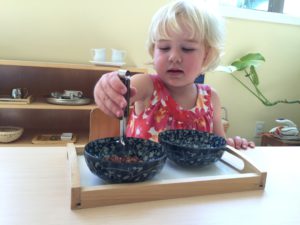 Practical Life
Practical Life
Practical Life exercises instill care for themselves, for others, and for the environment. The activities include many of the tasks children see as part of the daily life in their home, washing and ironing, doing the dishes, arranging flowers, etc. Elements of human civility are introduced with the exercises of grace and courtesy. Through these and other activities, children develop muscular coordination, enabling movement and the exploration of their surroundings. They learn to work at a task from beginning to end, and develop their will (defined by Dr. Montessori as the intelligent direction of movement), their self-discipline and their capacity for total concentration.
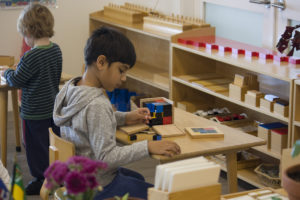 Sensorial
Sensorial
Sensorial Materials are tools for development. Children build cognitive efficacy, and learn to order and classify impressions. They do this by touching, seeing, smelling, tasting, listening, and exploring the physical properties of their environment through the mediation of specially- designed materials.
Language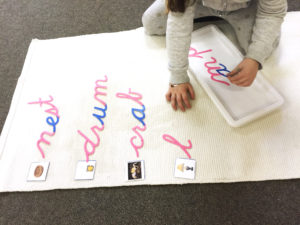
Language is vital to human existence. The Montessori environment provides rich and precise language. Language is explored phonetically in a Montessori classroom. When the children come into the classroom at around three years of age, they are given the opportunity to enrich the language that they have acquired in their small lifetime, in the simplest way possible. They are then able to use it intelligently with precision and beauty, becoming aware of its properties not by being taught, but by being allowed to discover and explore these properties themselves. If not pressured, they will learn to write, and as a natural consequence to read, never remembering the day they could not write or read in the same way that they do not remember that once upon a time they could not walk.
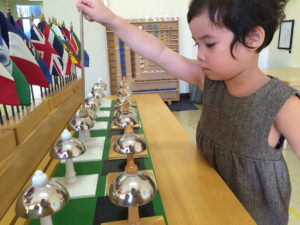 Cultural Extensions
Cultural Extensions
Geography, History, Biology, Botany, Zoology, Art and Music are presented as extensions of the sensorial and language activities. Children learn about other cultures past and present, and this allows their innate respect and love for their environment to flourish, creating a sense of solidarity with the global human family and its habitat.
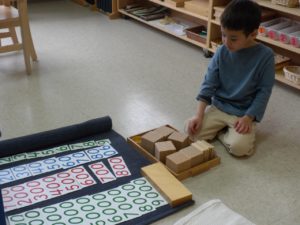 Mathematics
Mathematics
The Mathematics Materials help the child learn and understand mathematical concepts by working with concrete materials thus leading the child to the abstract. The Montessori materials provide the child with a sensorial and visual impression of numbers 1 – 10 leading on to the decimal system and the millions. The materials lay the basis for algebra and geometry.
Individual Education Plans & Specialist Teachers
Flexibility of procedure is the rule not the exception in Montessori. The child is always more important than pre-established routines, as such work is planned for each individual child based on his age, interests and ability, in Montessori philosophy this is known as following the child. Our program is committed to providing the child with opportunities to learn at his own pace The Montessori program is committed to supporting the spontaneous unfolding of the child. In keeping with this, the subject specialist in the Montessori classroom is avoided as much as possible. Too many adults in the environment make the child too dependent. The Montessori teacher must be a creative and flexible part of the child’s learning environment.
